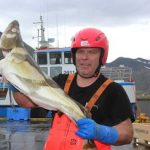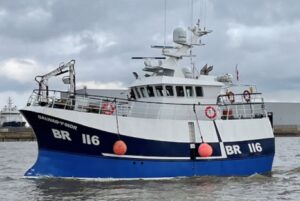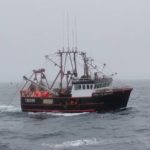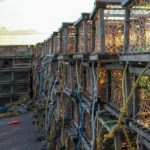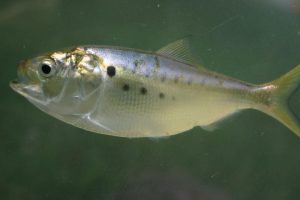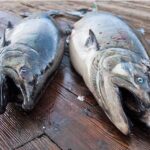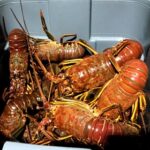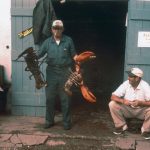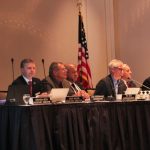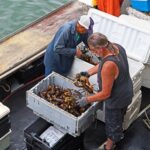Daily Archives: October 19, 2012
Now We’re Talkin”! Iron sprinkling project by a “messing around, bumbling guy,” spawned the growth of enormous amounts of plankton. NOAA provided 20 instrument-laden buoys, Claims the agency had been “misled”.
I love this! The scientific community and the econuts are OUTRAGED! Outraged I tell ya! You tell me what you think. Leave a comment.
A California businessman chartered a fishing boat in July, loaded it with 100 tons of iron dust and cruised through Pacific waters off western Canada, spewing his cargo into the sea in an ecological experiment that has outraged scientists and government officials. The entrepreneur, whose foray came to light only this week, even duped the National Oceanic and Atmospheric Administration in the United States into lending him ocean-monitoring buoys for the project. The iron spawned the growth of enormous amounts of plankton, which Mr. George, a former fisheries and forestry worker, said might allow the project to meet one of its goals: aiding the recovery of the local salmon fishery for the native Haida.
Massive fish kill continues in the Neuse River By Eddie Fitzgerald, Sun Journal Staff NewBern, North Carolina
A massive fish kill on theNeuseRiver that has been ongoing for nearly a month has resulted in thousands of menhaden washed up on beaches nearNeuseHarbor. Mitch Blake, Neuse Riverkeeper, viewed the area Tuesday afternoon, saying there were several hundred thousand dead fish washed up on the beach and in the river. For 21 days, mostly Atlantic menhaden have been dying over a large portion of the river fromNew Bernto Hancock Creek, Blake said in an email. Some of the dead menhaden have ulcers that National Oceanic and Atmospheric Administration officials have identified as Aphanomyces invadans from six samples analyzed in Beaufort.
http://www.newbernsj.com/news/local/massive-fish-kill-continues-in-the-neuse-river-1.31744
Chesapeake Bay Foundation Continually Misrepresents Status of Menhaden – using biased phrasing in their articles
In reference to menhaden, both articles uses the phrase “the most important fish in the sea,” which is frequently used without proper explanation. Originating from Rutgers University English Professor, Dr. H. Bruce Franklin’s book, The Most Important Fish in the Sea, the phrase stems from entirely qualitative judgements made by the author. There is no scientific evidence supporting the hyperbolic statement that any one species of fish is “most important,” and promulgating this idea represents only the authors’ opinion, rather than any scientific consensus.
Although the Epes article states that “The Chesapeake Bay Foundation is pushing for fair and reasonable limits to rebuild the menhaden population,” the organization does not provide a similar description of the status of the menhaden stock, using biased phrasing in their articles to make the species seem in worse condition than it actually is.
Southern Kingfish Association: Menhaden Vital To Ocean Life
October 18,  2012 — The decline of menhaden stocks has caused interest in the health of our oceans. Particularly from Nova Scotia to Texas coastal waters where menhaden once ruled nearshore waters. After a limited search for menhaden while navigating our sport fishing boat out to sea and coming up empty handed, we broke out a box of frozen cigar minnows and placed them into a saltwater filled bucket to thaw. Also called frozen popsicles, frozen cigar minnows are packed into five-pound boxes and used for a wide variety of fishing purposes. In recent years with the decline of coastal baitfish schools, boxes of frozen cigar minnows are frequently finding their way in fish coolers.
2012 — The decline of menhaden stocks has caused interest in the health of our oceans. Particularly from Nova Scotia to Texas coastal waters where menhaden once ruled nearshore waters. After a limited search for menhaden while navigating our sport fishing boat out to sea and coming up empty handed, we broke out a box of frozen cigar minnows and placed them into a saltwater filled bucket to thaw. Also called frozen popsicles, frozen cigar minnows are packed into five-pound boxes and used for a wide variety of fishing purposes. In recent years with the decline of coastal baitfish schools, boxes of frozen cigar minnows are frequently finding their way in fish coolers.
The article blames an alleged lack of menhaden in the Jacksonville, Florida area on commercial fishing in the Chesapeake Bay, over 600 miles away. This argument relies on anecdotal evidence from observations made by one boat on one day, and the schooling patterns of menhaden during two days of a fishing tournament.
anti menhaden fishing campaign is in full swing. Newport News Daily Press readers are presented with a biased editorial while Saving Menhaden Fisheries dissects and debunks.
Particularly, Mr. Joseph’s depiction of menhaden stock assessments and stock assessment science is riddled with inaccuracies, especially when he writes, “the science now shows what every recreational fisherman in the Bay has known for years, which is that the menhaden fishery has collapsed.” The “science” draws no such conclusion. Both the 2010 and 2012 menhaden stock assessments released by the ASMFC concluded that menhaden were not overfished, with the 2012 assessment measuring the stock at 40 percent above its fecundity threshold. This means that, far from having collapsed, the stock is producing more than enough eggs (40 percent more) to sustain itself.

































